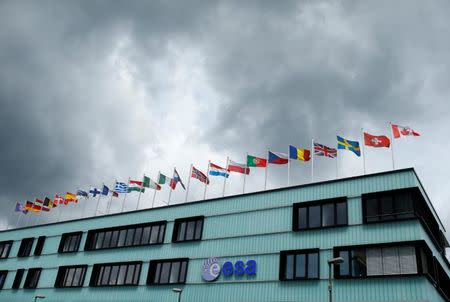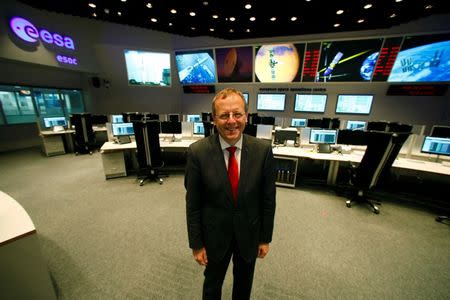European space agency expects members to back ISS, ExoMars
FRANKFURT (Reuters) - Europe's space agency expects its member states to back major programmes such as the International Space Station and the ExoMars mission to the Red Planet this week, even if it does not receive the full 11 billion euros (9.34 billion pounds) of funding it is requesting, its director general said. "If we get only 90 percent of the funding then this is not a catastrophe," Jan Woerner told Reuters in an interview ahead of a meeting in Lucerne on Thursday and Friday this week, at which ministers of the 22 member states of the European Space Agency (ESA) are to approve spending plans. ESA's investments over the coming years are to focus on a shift to what the agency calls "Space 4.0", in which big data becomes a key part of missions and privately owned space startups shake up the sector. A large portion of funding, at 1.6 billion euros, is to be earmarked for earth observation programmes, while another 1.2 billion is to be for telecommunications projects. ESA is asking for 800 million euros for Europe's participation in the International Space Station (ISS) through 2021 and wants approval to extend Europe's commitment to the space station through 2024. "From the discussions I have had so far with the member states, there was no member state saying we will close the European activity on the ISS. It's more that they are asking for clear results coming out of the ISS," ESA's Woerner said. European astronaut Thomas Pesquet arrived at the ISS this month, around five months after the return of Britain's first official astronaut, Tim Peake. "The UK is asking for another flight of Tim Peake. This is the normal game," Woerner said. The space agency also needs its member states to approve another 400 million euros of funding for the ExoMars programme, which is to send a rover to the Red Planet's surface in 2020. As part of ExoMars, Europe sent a gas-sniffing orbiter and a test lander to Mars this year, but the lander crashed due to a sensor failure last month. (Reporting by Maria Sheahan; editing by Ralph Boulton)

 Yahoo News
Yahoo News 

